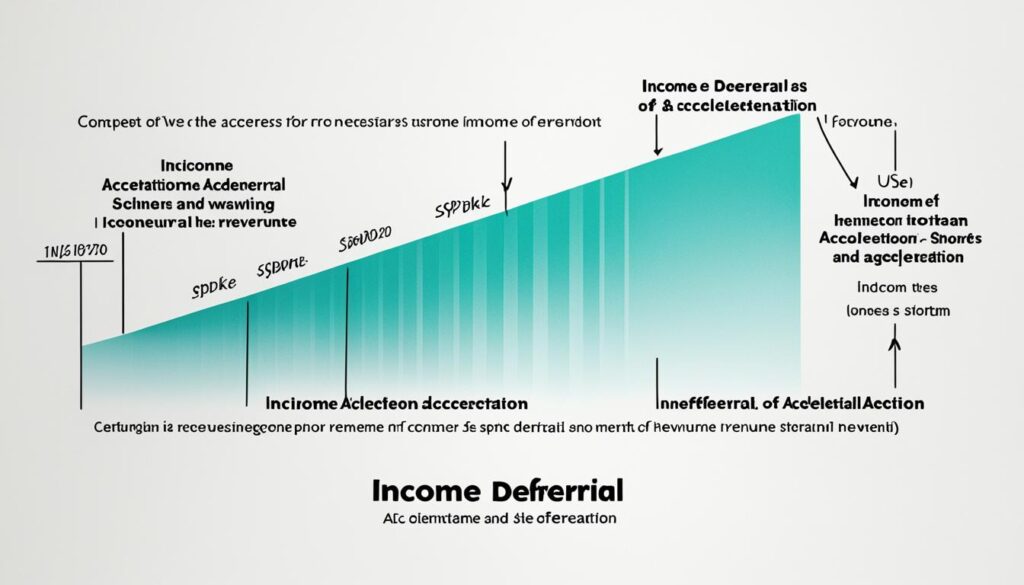Tax filing season often worries small business owners. They look for ways to cut down business taxes. Using available credits and deductions and choosing when to count income and expenses are useful strategies. These steps can significantly lower your tax load and boost your savings.

Are you aware that you can legally pay less tax and earn more as a small business owner? Explore tax planning methods today that can favor your business!
Key Takeaways:
- Timing revenues and expenses can help reduce your tax liability.
- Choosing the right tax status for your business can result in lower tax rates.
- Take advantage of tax deductions and credits to reduce your taxable income.
- Consider setting up a retirement account to enjoy tax advantages.
- Maximize tax benefits by hiring family members and utilizing health care savings accounts.
Consider a Tax Status Change
Thinking about your small business structure is key. There are many tax statuses like sole proprietorship and LLC. Each one has different tax effects. Picking the right one can help you save on taxes.
The Tax Cuts and Jobs Act changed corporate taxes. Now, C corporations have lower rates. This might be good for some businesses.
“Choosing the right tax status for your small business can change your tax duties. Consulting a tax expert is crucial to pick the best fit.”
– Source X
Talking to a tax expert can offer deep insights. They can look at your business and goals. They’ll suggest the best tax status to cut taxes while following the laws.
Comparison of Small Business Tax Statuses
| Tax Status | Tax Structure | Tax Implications |
|---|---|---|
| Sole Proprietorship | Owner reports business income on personal tax return | Separate tax entity not required |
| Partnership | Partners report business income on personal tax returns | Jointly liable for taxes and potential for self-employment taxes |
| LLC | Flexible tax structure: can be taxed as sole proprietorship, partnership, or corporation | Provides liability protection and potential tax advantages |
| S Corporation | Pass-through entity with owners reporting business income on personal tax returns | Potentially reduces self-employment taxes |
| C Corporation | Separate tax entity with corporate tax rates | Potential for lower tax rates under the Tax Cuts and Jobs Act |
Choosing the Optimal Tax Status
There’s no single solution when it comes to tax status. It depends on your business aims and profit expectations. A tax professional can help you choose what’s best for you.
Consider your business’s nature and growth when deciding. It’s vital to check your tax status often and adjust as needed.
Take Advantage of Tax Deductions
Small businesses can cut their taxes by taking certain deductions. These help them save money and pay less tax.
For businesses like sole proprietorships and partnerships, there’s the QBI deduction. It lets them reduce their taxable income by a piece of their earnings.
But, there are rules for the QBI deduction. Services businesses, or SSTBs, might have limits on this deduction. It’s good to talk to a tax expert to make sure you’re doing it right.
“The QBI deduction helps small businesses drop their taxable income, saving them money,” notes Jane Smith, a tax consultant. “Knowing the rules and limits is key.”
There’s also the home office deduction for business owners. It lets you write off costs for using part of your home for work. This includes things like rent and utilities.
To claim the home office deduction, you can pick from two methods. The simple method uses your office’s square footage. The other requires keeping detailed records of expenses.
Home Office Deduction Comparison
| Method | Pros | Cons |
|---|---|---|
| Simplified Method | Easier and less time-consuming | Potentially lower deduction amount |
| Actual Expenses Method | Potentially higher deduction amount | Requires meticulous record-keeping |
Using tax deductions wisely can greatly lower a small business’s tax bill. By understanding deductions for business income and home office costs, owners can pay less tax.
Leverage Tax Credits
Tax credits can reduce what your business owes in taxes. This is big for small business owners. By using tax credits, you can keep more money. Here are three tax credits that you should look into:
1. Work Opportunity Tax Credit
The Work Opportunity Tax Credit (WOTC) encourages businesses to hire people who often struggle to find jobs. This includes veterans, former prisoners, and long-term unemployed folks. Businesses can get a credit between $2,400 and $9,600 for each person they hire from these groups.
2. Disabled Access Credit
The Disabled Access Credit is for making your business more accessible if you own a small business. It covers costs like installing ramps and widening doors. You can get back up to 50% of what you spend on these improvements, up to $5,000 each year.
3. Small Employer Health Insurance Premiums Credit
If your small business offers health insurance, you might get the Small Employer Health Insurance Premiums Credit. It’s for businesses with fewer than 25 employees making less than $55,000 a year, on average. This credit can cover half of your costs for your employees’ health insurance.
These tax credits can lower what you owe in taxes, helping you save money. Remember to talk to a tax expert or use software to make sure you qualify. This way, you won’t miss out on any savings.

| Tax Credit | Description |
|---|---|
| Work Opportunity Tax Credit | Provides incentives for hiring individuals from certain target groups. |
| Disabled Access Credit | Helps offset costs associated with providing access for people with disabilities. |
| Small Employer Health Insurance Premiums Credit | Offsets the cost of offering employee healthcare coverage. |
Defer or Accelerate Income
Small businesses can save on taxes by planning when they earn or spend. By delaying income to a later tax year or speeding it up when taxes might go up, owners can lower their taxes. They can do this using the cash method of accounting.
This accounting method lets businesses record income when they get it and expenses when they pay. This way, they can control when to count income. They can postpone getting money until next tax year or get payments earlier to count in this year’s taxes.
If an owner faces high taxes and expects them to rise, they might speed up getting payments. By invoicing customers early, they use the lower current tax rate. This reduces their tax bill.

If an owner thinks they’ll have lower taxes next year, they can delay getting income. Delaying income lowers this year’s taxes and may cut total taxes owed.
However, not all businesses can use the cash accounting method. Some must use the accrual method. This method counts income and expenses when they happen, no matter when money actually moves.
Benefits of Income Deferral and Acceleration:
- Reduce current tax liability
- Optimize tax rates based on anticipated increases or decreases
- Improve cash flow management
- Provide flexibility in timing income recognition
“Timing the recognition of income and expenses can have a significant impact on a business’s tax liability. Small business owners should carefully evaluate the timing of invoices and payments to take advantage of income deferral and acceleration strategies.” – Tax Planning Consultant
Set Up or Contribute to a Retirement Account
As a small business owner, setting up a retirement account is important. It gives you financial security and tax benefits now. By saving in a plan like a 401(k) or a SEP, you can cut your taxes.
Retirement plans like the 401(k) let you make tax-free contributions. This means you don’t pay taxes on the money until you retire. It lowers your taxes now and encourages saving for the future.
A SEP is a good choice for business owners. You can save a part of your income and get tax breaks. This helps you prepare for retirement while reducing current taxes.
There’s also a tax credit for starting a retirement plan. It offsets the costs of setting up a plan for your business. This makes starting to save for retirement more affordable.

Regularly saving in a retirement account is wise for business owners. It ensures a secure future and reduces taxes now. Talk to a financial expert to pick the best plan for your business. Start planning for retirement today.
Understanding Business Tax Planning
Business tax planning is key for financial management in companies. It helps them get better at handling taxes and reduces what they owe. By looking closely at their finances and tax rules, companies can come up with smart plans. These plans legally lower taxes and boost profits.
It’s critical to follow tax laws to avoid fines and keep things running smoothly. Knowing about tax rules lets businesses make smart choices. They can take advantage of tax planning strategies to make the most of their money.
“Effective tax planning can help businesses keep more of their hard-earned money, improving cash flow and providing opportunities for growth and expansion.”
– Tax Planning Expert
Understanding tax rules and what you need to do is vital. Businesses can arrange their financial stuff well to handle taxes better. They can find deductions, credits, and other ways to save on taxes. This way, they use their money for important business needs instead.
But tax planning needs good thought about the company’s money, future plans, and the market. Every company’s tax situation is different. They need custom plans for the best tax savings.
In short, business tax planning helps companies deal with complicated tax rules. By keeping up to date and using smart tax strategies, they can use their money better and boost profits.
The Benefits of Business Tax Planning
Businesses that plan their taxes well can get a lot of benefits:
- Reduced Tax Liability: Using deductions, credits, and other strategies helps lower their total tax bill.
- Improved Cash Flow: Paying less tax means more money for the business. This money can help grow the business or start new projects.
- Enhanced Profitability: With lower taxes and more cash, businesses can make more money and be financially stronger.
- Competitive Advantage: Smart tax planning gives businesses an edge. It helps them manage money better and make smart choices in pricing and investing.
In conclusion, planning taxes well is crucial for companies that want to manage their money well and lower their taxes. By knowing tax laws and using smart tax strategies, businesses can increase profits and succeed in the long term.
| Tax Planning Strategies | Description |
|---|---|
| 1. Deductions and Credits | Identify eligible deductions and claim applicable tax credits to reduce taxable income. |
| 2. Timing of Income and Expenses | Strategically defer or accelerate income and expenses to optimize tax liability. |
| 3. Choosing the Right Business Structure | Select a business entity type that provides tax advantages and aligns with long-term goals. |
| 4. Retirement Planning | Set up retirement accounts and maximize contributions to reduce taxable income. |
| 5. Qualified Business Income Deduction | Utilize the QBI deduction for pass-through entities to reduce taxable income. |

Types of Business Structures and Their Tax Implications
Choosing the right structure is key when starting a small business. The choice you make, whether it’s a sole proprietorship, partnership, LLC, S corporation, or C corporation, impacts your taxes. It affects your tax obligations and the pros and cons tax-wise.
Sole proprietorship: This structure is simple and quite common. If you choose this, you’re personally responsible for your business’s debts. You will report your business income and costs on your own tax return. You’ll also need to pay self-employment taxes.
Partnership: A partnership involves two or more people running a business together. In partnerships, the business’s profits and losses are reported by the partners on their personal tax returns. Like sole proprietors, partners pay self-employment taxes.
LLC (Limited Liability Company): Many small businesses go for an LLC. It offers liability protection without the complexity of a corporation. LLCs are also pass-through entities for taxes, meaning members report their share of profits and losses personally.
S corporation: An S corporation prevents double taxation for shareholders. It’s a pass-through entity. Shareholders report the business’s income and losses on their own returns. Yet, S corporations have more rules to follow than LLCs.
C corporation: A C corporation protects its owners’ personal assets. It’s treated as a separate entity. C corporations face double taxation. The business pays taxes, and shareholders pay taxes on dividends.
It’s wise to think about what structure fits your needs tax-wise. Talking to a tax professional can clarify what each choice means for your taxes.
Comparison of Business Structures
| Business Structure | Tax Obligations | Tax Advantages | Tax Disadvantages |
|---|---|---|---|
| Sole Proprietorship | Report income and expenses on personal tax return, pay self-employment taxes | – Simple and easy to set up – Pass-through taxation |
– Personal liability for business debts – Limited tax deductions |
| Partnership | Report income and losses on personal tax returns, pay self-employment taxes | – Shared decision-making and workload – Pass-through taxation |
– Joint and several liability for partners – Limited tax deductions |
| LLC | Report income and losses on personal tax returns, pay self-employment taxes | – Limited liability protection – Pass-through taxation |
– Complex regulations in some states – Self-employment taxes |
| S Corporation | File corporate tax return, report income and losses on personal tax returns | – Limited liability protection – Avoid double taxation |
– Strict eligibility requirements – More administrative responsibilities |
| C Corporation | File corporate tax return, shareholders taxed on dividends | – Limited liability protection – Flexibility in ownership and stock options |
– Double taxation – More complex record-keeping |
Choosing a business structure is a big decision with lasting tax effects. Understanding each structure’s tax duties, benefits, and drawbacks helps you choose wisely for your business.

Maximizing Tax Deductions and Credits
Small business owners can lower their taxes and increase profits with tax deductions and credits. By keeping track of expenses that qualify, they can cut down their taxable income. It’s important to know about these deductions and credits:
Deductible Business Expenses:
Running a business means you can deduct many costs. For instance, you can reduce your taxable income with the following expenses:
- Office rent and utilities
- Business supplies and equipment
- Advertising and marketing costs
- Professional service fees
- Employee wages and benefits
- Travel expenses
Make sure to save all receipts and records. This helps in deducting all expenses properly.
Employee Benefits:
Offering benefits helps in hiring and keeping great employees, and it saves taxes too. Costs for things like:
- Health insurance premiums
- Retirement contributions
- Life insurance premiums
- Disability insurance premiums
Offering these perks is good for your team and helps save on taxes.
Retirement Contributions:
Setting up a retirement plan can secure your financial future and save on taxes. Contributions to plans like a 401(k) or SEP are deductible. This lowers your taxable income, saving you money.
Health Insurance Premiums:
You can also deduct health insurance costs for you and your workers. This helps reduce the expense of healthcare coverage.
Travel Expenses:
Business travel costs are deductible if they are necessary and well-documented. Keep all records and receipts. Mixing some personal time with business trips can also have tax advantages. Make sure the main reason for the trip is business-related.
Employment Taxes:
Businesses must pay several taxes, like Social Security and Medicare taxes. There are also tax credits available, including the Work Opportunity Tax Credit (WOTC) for hiring certain people.
Excise Taxes:
Some businesses might need to pay taxes on specific goods and activities. Know the excise tax rules and make sure you’re reporting and paying correctly.
Taking advantage of tax deductions and credits helps keep more money in your pocket. Talk to a tax expert to make sure you’re getting all the breaks you can for your business.

| Deductions/Credits | Description |
|---|---|
| Deductible Business Expenses | Expenses necessary for running the business, such as rent, supplies, and advertising costs. |
| Employee Benefits | Costs associated with providing employee benefits like health insurance and retirement contributions. |
| Retirement Contributions | Contributions to retirement accounts like 401(k) plans and SEP plans, which are tax-deductible. |
| Health Insurance Premiums | Deducting the cost of health insurance premiums for yourself and your employees. |
| Travel Expenses | Deducting necessary and properly documented business-related travel expenses. |
| Employment Taxes | Taxes paid by businesses for Social Security, Medicare, and unemployment, with potential tax credits available. |
| Excise Taxes | Taxes on specific goods, services, or activities that some businesses may be subject to. |
Benefits of Hiring Family Members and Maximizing Health Care Savings
Small business owners can gain much from hiring family. They bring skills and dedication, not to mention tax benefits. Employing family lets owners deduct wages from their taxes. This reduces taxable income and saves money.
An HSA, or Health Savings Account, also offers big benefits. It’s a special account for those with high-deductible health plans. Money put into an HSA isn’t taxed. This lowers the business owner’s taxable income even more.
Combining the power of hiring family with HSA savings boosts finances greatly. It also helps business owners keep more of their earnings.
Consider a business owner hiring their spouse to help out. The wages paid can be written off as business expense. This lowers the taxable income. Plus, contributing to an HSA with pre-tax dollars means even more savings for the future.
Here’s an example of the potential tax savings:
| Taxable Income Before Deductions | Taxable Income After Deductions | |
|---|---|---|
| Without hiring family member and HSA contributions | $100,000 | $100,000 |
| With hiring family member and HSA contributions | $100,000 | $90,000 |
In this case, the business owner’s efforts cut down taxable income by $10,000. This maneuver presents a clear path to tax savings.
Changing Business Structure and Deducting Travel Expenses
Managing taxes is key for small business owners. Changing from a sole proprietorship to an LLC, or to a corporation, has pros and cons. Talking to a tax expert is essential. They can help weigh the pros, like lower taxes or more liability protection, against cons, such as increased costs.
Small business owners shouldn’t forget about travel expense deductions. These can cover transport, lodging, meals, and more. But, it’s vital these expenses are necessary and well-documented.
Combining business with personal travel can boost deductions. Say you’re going to a business conference and decide to stay extra days for fun. You can still deduct costs linked to the business part of your trip. Plus, earning frequent flier miles on business trips brings extra tax perks.
Knowing how changing your business structure and claiming travel expense deductions can better your taxes is important. It helps small business owners stay financially healthy.